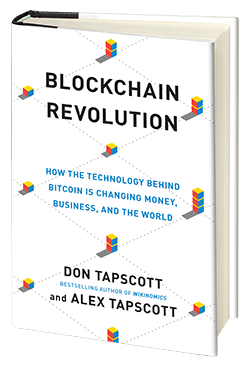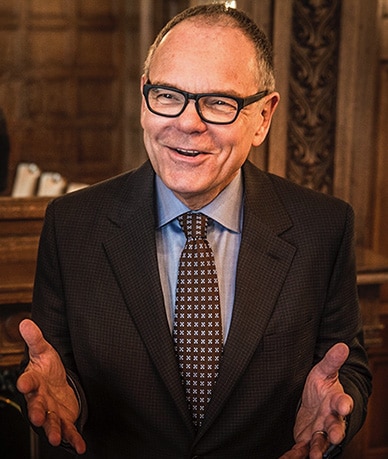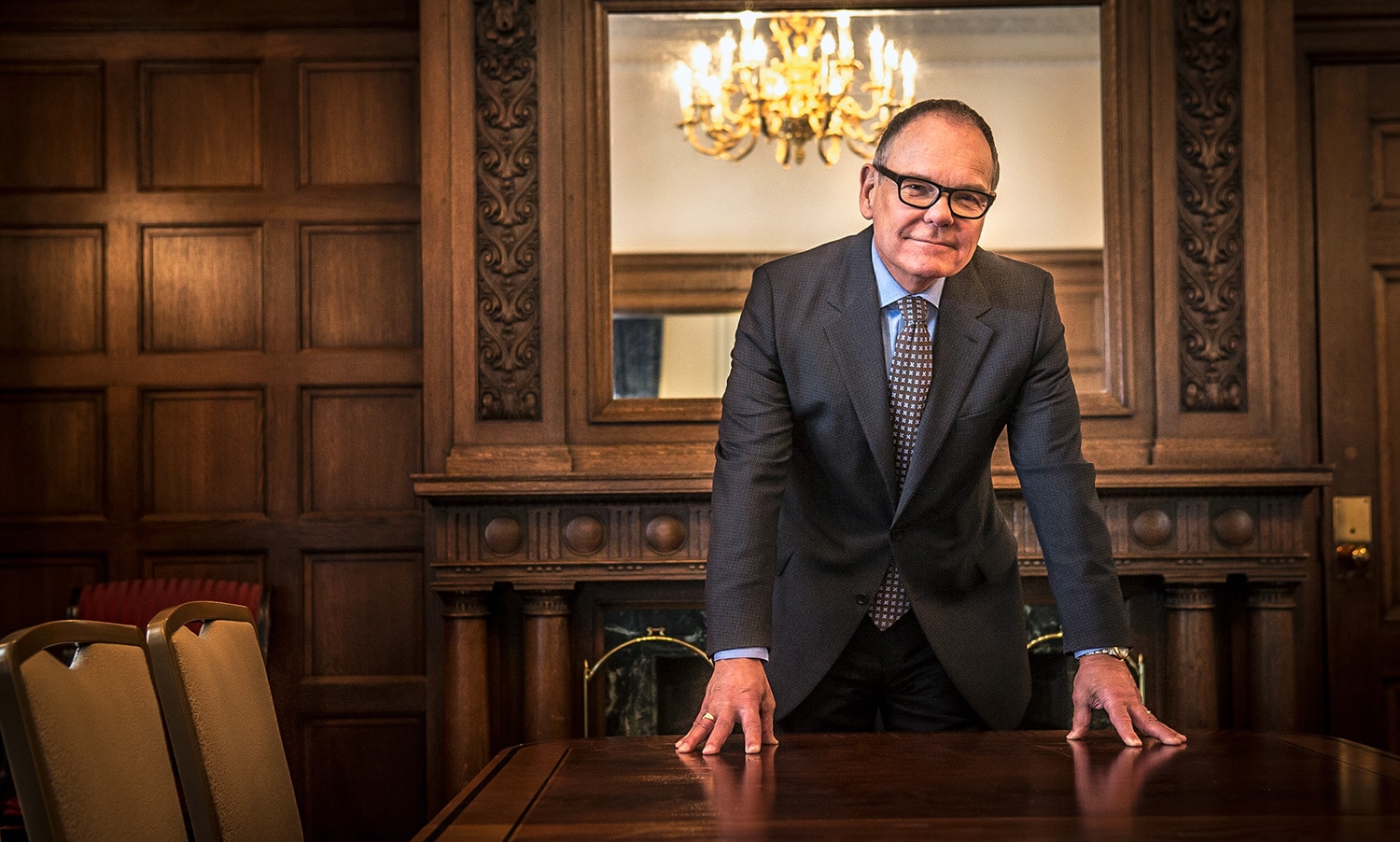Discover Don Tapscott‘s Top Tips for Success and Future Predictions for the Financial Services Industry
Don Tapscott is among the world’s most notable thought-leaders on Blockchain technology, modern media, disruptive innovation, and the economic/societal implications of the aforementioned. He is the Chief Executive Officer of The Tapscott Group, and was founder and chairman of the international think tank New Paradigm prior to its accession in 2007.

Don Tapscott has authored/co-authored 15 books, including most recently: Blockchain Revolution. He is also featured in our Top 100 Most Influential Blockchain Insiders, having held his #1 spot (decided by Artificial Intelligence) since October 2016.
In this Q&A interview Don Tapscott shares his top tips on the development of Blockchain technology, networking successfully, establishing economic growth, learning from experiences, and much more.
Wait no longer, read this exclusive interview with Don Tapscott below now…

What does being an author mean to you?
I’m not primarily an author. I do research and have various ways of communicating my findings and conclusions. Writing is probably the most important way. Notwithstanding all the emphasis on multi-media I still think there is no medium more important to civilization than the written world.
What inspired you to write Blockchain Revolution?
A conversation with my son Alex on a father son ski trip three years ago. Alex was an executive at an investment bank and had taken responsibility for their growing deal flow for bitcoin startups. I was writing introduction to the 20th Anniversary edition of the Digital Economy and was looking into crypto currencies as the next big thing in technology. One thing led to the next and we decided to do a bunch of research projects on how blockchain might change business and the world.
Why do people need to pay attention to Blockchain technology?
Because it’s nothing less than the second era of the Internet. For decades we’ve had the Internet of information. Now we’re getting the internet of value. This will enable profound changes in the nature of firms: how they are funded and managed, how they create value, and how they perform basic functions like marketing, accounting, manufacturing and innovation. In some cases, software will replace management altogether. We can fix the deep structures and architecture of government and how we create public value and maybe even build a second era of democracy based on accountability to citizens, transparency and a culture of public deliberation. More broadly it gives those of us who want a better world another kick at the can to rewrite the economic power grid and the old order of things.
How will Blockchain technology change the financial services industry?
I agree with Ben Lawsky (former Superintendent of Financial Services for New York State) that in 5-10 years the industry will probably be unrecognizable. Whether it’s the incumbents or new players that do the disrupting remains to be seen. Although as I said in Paradigm Shift in 1993, “Leaders of old paradigms typically have great difficulty embracing the new.” The best short (18 minute) overview of bow blockchains will change this industry is Alex Tapscott’s TEDXSanFrancisco talk “Blockchain is Eating Wall Street.”
What business do you admire the most (apart from yours)?
This week I’m admiring Kelloggs for pulling its advertising from Breitbart News. It’s great to see a company act with integrity.
What do you find challenging about being a business executive in your industry?
Well, my main business is a think tank. Over the years it’s always been relatively straightforward to come up with important new ideas, identify new paradigms and strategies to move forward. The challenge has always been to bring about change in our clients.
What advice would you give to startups?
I wrote an article about this for LinkedIn last year. The main suggestions were:
- Create a Business with Customers that pay you for your product or service.
- Don’t seek Venture Capital, but rather rely on angels and consider crowdfunding.
- Consider being a Social Entrepreneur.
- Partner. The Internet and now blockchain enables start-ups to focus on what you do best and partner to do the rest. Create an open stage where large communities of partners can create value, and in many cases, create new businesses.
- Don’t Give Up. From my experience the conventional wisdom is correct not banal. “90 percent of everything is just showing up.” Success is 90 percent perspiration and 10 percent inspiration.” Or as Winston Churchill said “If you’re going through Hell keep going.” It’s a lot of hard work to build a business. But it’s worth it.
If you could spend a day hanging-out with three people from history, who would they be? Why? What would you like to ask them?
I’d love to chat with William Shakespeare, Leon Trotsky and Albert Einstein. But given that our conversations would probably alter the space-time continuum and future history, and thereby likely obviating the possibility of my existence, I’ll take a pass.
What experiences in your formative years helped you to become who you are?
My parents were always big on doing the right thing and following your dreams. They were angry about injustice and I remember us talking about big problems in the world a lot. Making money to them was never a goal, and at best a bi-product of doing something consequential.
What would you do differently in your life, if anything?

How have you gone about building such an incredible network of contacts from notable thought-leaders such as Steve Wozniak, Dan Schulman, Marc Andreessen, Walter Isaacson, and Klaus Schwab to mainstream media outlets such as The Wall Street Journal, Financial Times, Forbes, Fortune, and Oxford Economics?
I’ve been around a long time and I suppose that if you do good work people will notice and want to collaborate with you.
What are some of your aims for the next five years?
Alex and I are both on the Blockchain revolution like dogs on a bone. This is a major innovation that holds unlimited promise for the world. So we’re launching a $multi-million research program on blockchain transformations. This will be the central program for a new center we’re founding called The Blockchain Institute. Beyond this huge collaboration, Alex and I also diverge a bit on our focus. He’s into helping early stage companies become powerful and in doing so help build the innovation economy through his company North West Passage Ventures. I’m at that stage in my life where I’m focused on how we can move this shrinking planet forward. Right now, as the industrial age finally comes to an end there is much dislocation and what that happens people who just can’t get ahead become vulnerable to the Teachings of extremist demagogues. The world is becoming less safe, less equal, less just and less sustainable. I’m hopeful that with a new paradigm in technology we can turn things around. In Early 2017 I’ll be publishing my take on A New Social Contract for the Digital Economy.
If you enjoyed this interview with top Blockchain influencer Don Tapscott, share and comment please.




